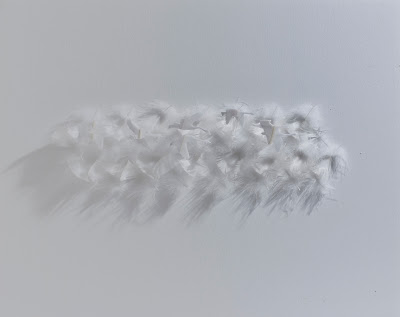 |
| Swan Feather cutouts --mute swan |
Someone actually counted every feather on a swan and came to
the conclusion that they have more feathers than any other bird on earth. I’m not sure that is true although it is the generally
accepted or at least most widely quoted figure:
24,000. Take the numerous outer
feathers away on a bird like this and you have essentially a long underwear-like layer of soft down
feathers.
Everyone knows a swan is all white. The all-white swan is beautiful and often
triggers notions of the meaning of white, like purity and angels. But white feathers are weaker and less
durable than black ones. Why? It has to
do with the protein melanin, the same stuff that makes light-skinned people tan
and gives some people freckles. Melanin
in feathers strengthens them against wear and also makes them black or reddish
brown. Many large birds need their
primary flight feathers to last a long time.
A lot of mostly-white birds have black feathers where they need the
strength and durability—in the flight feathers. White pelicans, snow geese,,
white stork, wood stork, and many seagulls are mostly white except for their
primary flight feathers.
So then why is the Black Swan from Australia is all black
except the tips of the wings white? I
don’t know for sure but assume that it’s because swans just keep their wings
folded in when they feed, so except for flying, they don’t have to worry as much as
other birds about wear and tear on their wing feathers.
I have been working a little with Martha Jordan of the Trumpeter Swan Society whose work includes rehabilitating, protecting, and
reintroducing Tundra Swans.

No comments:
Post a Comment